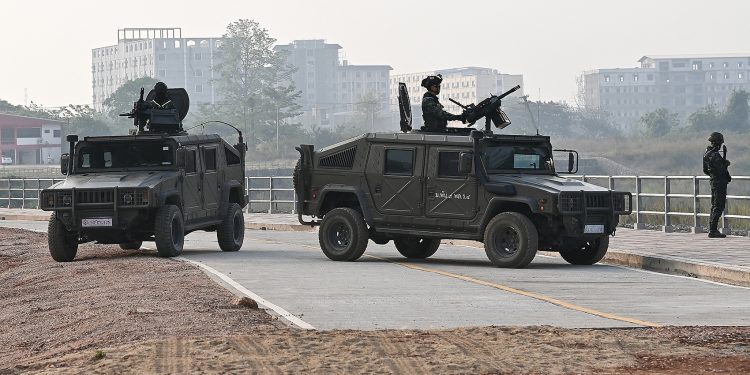BANGKOK— Southeast Asian regional bloc the Association of Southeast Asian Nations [ASEAN] said it is “deeply concerned” about a recent upsurge in fighting in Myanmar, after fierce clashes over a key trading hub on the Thai border.
The foreign ministers of the Association of Southeast Asian Nations urged “all parties for an immediate cessation of violence” in Myanmar, which has been roiled by conflict since the military seized power in a February 2021 coup.
The ministers’ statement issued late Thursday said 10-member ASEAN was “deeply concerned over the recent escalation of conflicts, including in the area of Myawaddy”.
The military was forced to pull its troops out of positions in the valuable trading post last week after days of battling the Karen National Union (KNU), a long-established ethnic minority armed group, and other anti-junta fighters.
It was the latest blow suffered by the junta, which has suffered a string of battlefield losses in recent months, with some analysts warning it was its most significant threat yet.
Myawaddy is important to the cash-strapped junta, with more than $1.1 billion worth of trade passing through it in the 12 months to April.
The clashes drove people to flee across the border into Thailand, from where gunfire and the boom of artillery barrages could be heard.
There have been no major clashes in the town since then, although fighting rumbles on around the town of Kawkareik, some 30 kilometres (20 miles) southwest of Myawaddy on the main highway.
The junta is anxious to avoid losing another major town, analysts say, following the humiliating surrender of around 2,000 troops at the town of Laukkai on the northern China border in January.
UN warning
Parts of the country that have been previously peaceful have been sucked into the conflict, including in Rakhine state where a longstanding ceasefire ended in November.
UN human rights chief Volker Turk said on Friday clashes between the military and the Arakan Army, alongside tensions being fueled between the Rohingya and ethnic Rakhine communities, meant there was a serious risk of a repeat of previous atrocities.
“The alarm bells are ringing, and we must not allow there to be a repeat of the past,” Turk said in a statement.
However, despite the losses and uptick in fighting, analysts believe the junta is not in dire peril yet.
“In the larger scheme of things, the regime is clearly losing control of many areas in the periphery,” independent Myanmar analyst David Mathieson told AFP about the Myawaddy clashes.
“There is still a long way to go for the SAC to fall,” he said, using the acronym of the junta’s official name.
ASEAN has led diplomatic efforts to ease the crisis but has little to show for it, with more than 4,400 people killed and nearly 20,000 in detention in the military crackdown according to a local monitoring group.
Little progress has been made since 2021 when the bloc agreed on a five-point peace plan— which Myanmar signed up to but has failed to implement.
And friction has also erupted between ASEAN members over differing approaches to the crisis, with some like Thailand — which has a 2,400-kilometre border with Myanmar—appearing more willing to engage.
Thailand has also said it is ready to receive people from Myanmar, though the kingdom’s foreign minister warned it would not tolerate any violation of its sovereignty.
The Thai air force said on Friday it had deployed an F-16 fighter plane to “protect sovereignty” along the border.
The conflict in Myanmar has provoked a previous Thai response, with the kingdom scrambling jet fighters in 2022 after junta planes breached the border during operations against anti-coup fighters.

















